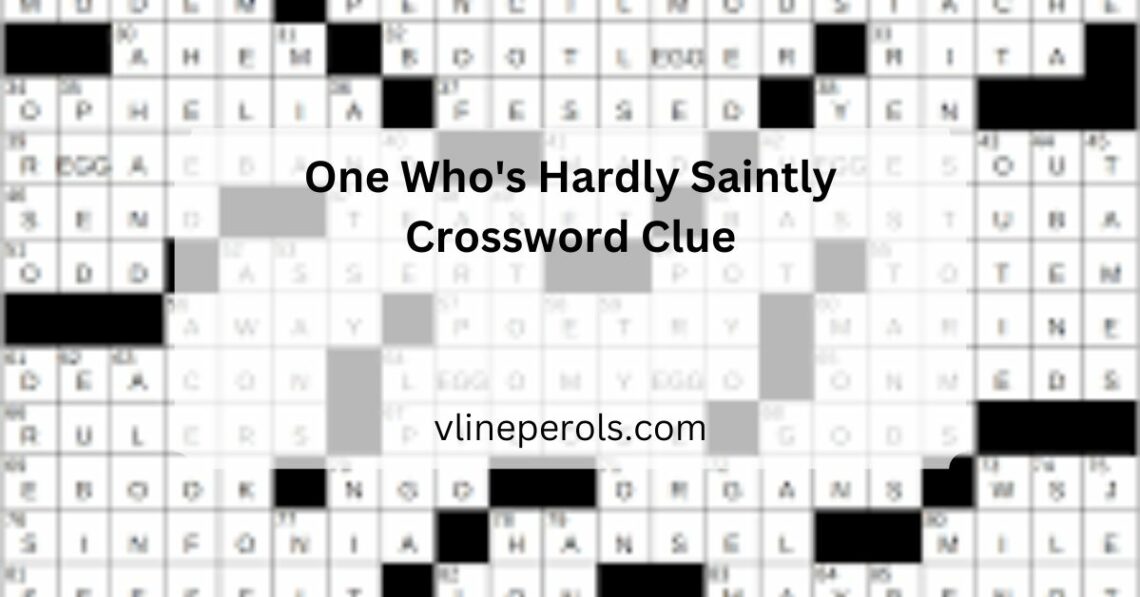
One Who’s Hardly Saintly Crossword Clue – Unlocking The Mystery!
In the world of crossword puzzles, fans sometimes get stuck trying to figure out tricky clues and word games. One common puzzle that can be really challenging is the clue that says “one who’s hardly saintly.”
The crossword clue “one who’s hardly saintly” likely refers to the word “sinner.” In crossword puzzles, clues often use wordplay or double meanings to lead to the solution. In this case, “hardly saintly” suggests the opposite of a saint, which would be a sinner.
Exploring the complex world of solving crossword puzzles, this article explains the answer to this tricky problem while looking at the clever ways words are used in crossword puzzles.
Table of Contents
Navigating The Puzzle – Finding The Right Answer!
Trying to solve the crossword clue “one who’s hardly saintly” is like finding your way through a tricky maze. This clue needs more than just a quick look – it needs you to think carefully and use your smarts.
Solving a crossword is like solving a puzzle with words. With this clue, you have to break it down to understand what it’s really asking. It might seem like it’s talking about being good or bad, but it’s actually trickier than that.
The clue uses the words “hardly saintly” to throw you off track. It wants you to think about someone who isn’t good. But if you look closer, you’ll see that it’s not about being good or bad – it’s about being the opposite of a saint. And that’s where the answer comes in: “sinner.”
Strategies For Deciphering Challenging Clues – Master Your Skills!
When you’re faced with a tough clue, like “one who’s hardly saintly,” it can feel like you’re up against a big challenge. But don’t worry! Here are some simple tips to help you crack the code:

1. Think in Different Ways: Sometimes, clues can mean more than one thing. Instead of just going with the first idea that comes to mind, try thinking about other possible meanings. For example, with “one who’s hardly saintly,” don’t just focus on “saintly.” Think about what the opposite of that might be.
2. Break it Down: Clues can be like puzzles within puzzles. Take a closer look at the clue and see if you can find any hints hiding inside. Look for words or phrases that might give you a clue about what kind of word you’re looking for. For instance, with “one who’s hardly saintly,” pay attention to “hardly saintly” and think about words that fit that description.
3. Find Similar Words: Sometimes, clues use words that mean the same thing or the opposite of the answer. If the clue seems too easy, try thinking of other words that mean the same thing. For “one who’s hardly saintly,” you could think of words like “wrongdoer” or “sinner.”
4. Look for Patterns: Crossword puzzles often follow certain rules or patterns. Pay attention to how long the clue is and how many letters you need for the answer. This can help you narrow down your choices and find the right word.
5. Use What You Know: Even if you don’t know everything, you probably know more than you think! Use your own knowledge and experience to help you solve the clue. If you come across a clue that seems to be about something specific, think about what you know about that topic.
6. Check a Thesaurus: A thesaurus is like a big book of words that mean the same thing. If you’re stuck on a clue, try looking up similar words in a thesaurus to see if anything fits.
7. Ask for Help: Don’t be afraid to ask for help if you’re really stuck! Talk to a friend or family member, or look online for tips and advice. Sometimes, just talking about the clue with someone else can help you figure it out.
Understanding Crossword Clues Literal vs. Wordplay:
In crossword puzzles, figuring out the clues is like finding your way through a maze of words. The big challenge is knowing if a clue means exactly what it says or if it’s playing with words. For example, when you see the clue “one who’s hardly saintly crossword clue,” you have to really look at it closely and think carefully to understand what it’s asking for.
1. Literal Interpretation: Taking Clues at Face Value
Some crossword clues are straightforward and require solvers to interpret them literally. These clues provide direct hints that lead to the solution without the need for additional interpretation. For instance, a clue like “Capital of France” would straightforwardly lead to the answer “Paris.” Similarly, when encountering a clue like “one who’s hardly saintly crossword clue,” solvers might initially be tempted to consider it at face value, focusing solely on the concept of a person who is not saintly.
2. Wordplay: Delving Deeper into the Clue’s Essence
Unlike straightforward clues, some crossword hints use clever wordplay to convey their meaning in a tricky way. These hints may include sneaky language tricks like jokes, rearranged letters (anagrams), or words with more than one meaning. Solvers need to think creatively when dealing with these clues.
For example, when you see a clue like “one who’s hardly saintly crossword clue,” you should realize that it’s not just asking for a simple answer but likely has a hidden meaning or wordplay involved.
3. Deciphering Wordplay:
To tell if a clue is straightforward or tricky, solvers should look closely at the words used. If there are hints that the meaning might not be exactly what it seems, like in “one who’s hardly saintly crossword clue,” with “hardly” hinting something isn’t quite right, then it’s likely not a plain clue.
Furthermore, when solving puzzles, it’s helpful to think about different ways to understand the clue. Instead of just thinking about being a saint, try thinking about other words or ideas that might be related. This can help you see more possibilities and find the right answer. So, don’t be afraid to look at the clue from different angles to figure out what it’s really saying
4. Solving the Puzzle:
When confronted with a clue like “one who’s hardly saintly crossword clue,” solvers can apply these strategies to guide their approach. Instead of fixating on a literal interpretation, they should consider the possibility of wordplay and explore alternative meanings or associations of the words used. By adopting a flexible and open-minded mindset, solvers can navigate the complexities of crossword puzzles with confidence and skill.
Online Resources Or Communities For Crossword Enthusiasts – Here’s An Expanded Section!
For people who really love doing crossword puzzles, the internet has a lot of places where you can find more puzzles and talk to other people who like them too. And if you’re trying to figure out tricky clues like “one who’s hardly saintly crossword clue,” these places can give you tips, tricks, and help when you need it.

1. Crossword Puzzle Websites:
There are websites that have lots of different crossword puzzles for you to try. Some of them, like The New York Times Crossword and The Guardian Crossword, have puzzles you can do every day. They also have places where you can talk with other people who are solving the same puzzles as you. So if you’re stuck on a clue like “one who’s hardly saintly,” you can ask for help and share tips with others.
2. Social Media Groups:
You know how you can find groups for all kinds of interests on Facebook and Twitter? Well, there are groups for crossword fans too! These groups share fun stuff about crossword puzzles and sometimes even have contests or challenges. If you join one of these groups, you can meet other people who enjoy puzzles just like you do, and maybe even get some help with that tricky “one who’s hardly saintly Crossword Clue”.
3. Online Solver Tools and Apps:
Sometimes, puzzles can be really tough, and that’s okay! There are tools and apps online that can help you when you’re stuck. You can type in the letters you know, and these tools will give you possible answers. It’s like having a little helper to guide you through the tough parts of the puzzle, including those tricky clues like “one who’s hardly saintly Crossword Clue.”
4. Puzzle Blogs and Podcasts:
If you’re interested in learning more about how crossword puzzles are made or just want to hear people talk about them, puzzle blogs and podcasts are perfect for you. They have articles and episodes that talk about all sorts of things related to puzzles, like how they’re made and tips for solving them. You can learn a lot and maybe even get better at solving clues like “one who’s hardly saintly Crossword Clue.”
FAQs – Navigating Common Queries:
1. Are there other synonyms for “sinner” that might appear in crossword puzzles?
Yes, crossword puzzles often employ a variety of synonyms to convey the concept of moral transgression. Some alternatives to “sinner” include “wrongdoer,” “evildoer,” and “transgressor.”
2. How can I improve my crossword-solving skills?
Practice is key to mastering the art of crossword puzzles. Familiarize yourself with common clue types, expand your vocabulary, and approach each puzzle with patience and perseverance.
3. What are some strategies for deciphering challenging clues like “one who’s hardly saintly”?
When confronted with ambiguous clues, consider alternate interpretations and explore word associations. Break down the clue into its component parts and look for subtle hints or wordplay.
Conclusion:
In the world of crossword puzzles, each clue is like a small piece of a bigger picture. “One who’s hardly saintly” is a good example of how clever puzzle makers and smart solvers work together.
By figuring out these clues, we learn not just new words but also interesting things about people. So, when you see this tricky clue, stay curious, pay close attention, and you’ll discover its hidden meaning.
You May Also Like

N Spaulding Ave – A Comprehensive Guide!
March 6, 2024
Pokemon Infinite Fusion Larvesta – Detailed Guide
February 1, 2024

